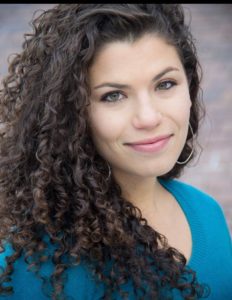Posted on September 15, 2019
 As many of you know, this month ushers in not only a return to school and to shul, but also the debut of our new cantor, Emily Simkin. Student Cantor Simkin is thrilled to be part of the Temple Beth-El community, and is looking forward to helping our congregation continue to grow musically and spiritually through song.
As many of you know, this month ushers in not only a return to school and to shul, but also the debut of our new cantor, Emily Simkin. Student Cantor Simkin is thrilled to be part of the Temple Beth-El community, and is looking forward to helping our congregation continue to grow musically and spiritually through song.
Cantor Simkin’s roots are in the nearby Philadelphia suburbs, where her family was actively involved in their Conservative synagogue. She loved those early experiences of Jewish religious life in a tightly knit community, fondly recalling how the temple minyan “regulars” were like an extended family to her.
As a young child, she attended URJ Camp Harlam for the first time. It was her first experience with the musical traditions of Reform Judaism, and it not only broadened her perspectives on Judaism but set her on her cantorial career path. “At camp, I was exposed to Jewish music as a vehicle for spirituality,” Cantor Simkin recalls. “There was something truly magical about that, and it made me feel part of the camp community in a very special way.” That summer, at barely nine years old, she decided she wanted to be a cantor.
Returning home with her mind made up, she began to plan her next steps. Understanding that she needed to strengthen her Hebrew and religious foundation if she was to be a cantor, she set her sights on Akiba Hebrew Academy (now Jack M. Barrack Hebrew Academy), a day school in Bryn Mawr, Pa., where she began studying shortly after her bat mitzvah. While there, she also explored her love of music through performing in musical theater.
Attending Berklee College of Music in Boston affirmed her drive to guide others spiritually through music – “to sing with people, not to them as a performer,” she explains. Throughout college, she kept in close contact with the Hebrew Union College-Jewish Institute of Religion’s admission officers to ensure she was taking the right steps to prepare for cantorial school someday.
After college, she continued on to Hebrew Union College-Jewish Institute of Religion for her first year of cantorial school in Jerusalem, Israel. She returned stateside to New York City, where she is now in her fifth year of cantorial school, and where she will be ordained as a cantor in May 2020. A newlywed, she and her husband, Adam, who is a medical student at Touro College of Osteopathic Medicine in New York City, live in Harlem.
Cantor Simkin says she was struck by the warmth and vitality of Temple Beth-El from her very first meeting with the professional and lay leadership. “It’s very important to me to have my cantorial and spiritual home be one and the same, “she remarks. “At Temple Beth-El, I feel extremely fortunate to work with such great leadership. TBE brilliantly blends tradition and progressive values. It is such a vibrant community where people really matter.”
Our new cantor brings to her role a longstanding passion for pastoral care, which was reinforced by her stint at Memorial Sloan Kettering as a chaplain intern. She has also been influenced by her experiences serving a congregation in Hawaii. Mindfulness is important to her and is some-thing she brings to both her observance of Shabbat and, in her spare time, her yoga practice. As Cantor Simkin points out, the Hebrew word neshema (breath) and neshama (soul) share the same Hebrew root. This is why she finds singing and music so deeply spiritual in connecting with Judaism and with the temple community as a whole.
As Cantor Simkin prepares for her first High Holy Days with our congregation, her goal is “not to change TBE’s rich musical culture, but to add to it and help it grow.” She is excited to meet more members of the congregation and to work with both the adult and children’s choirs. “There is so much meaning in the intention we bring to singing and praying together. That’s why I want as many people as possible to be on the bima with me. We need everyone’s voice to be heard.” We couldn’t agree more. Welcome, Cantor Simkin!
Originally published in the September-October 2019 issue of the Shofar. For more issues of the Shofar, visit the Shofar archives.